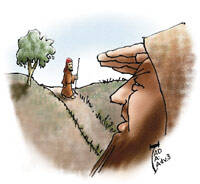Patient Expectation
There comes a time in almost everyone’s life when a person wonders whether all the hard work and all the commitments are worth anything. Are you really making any difference in the world? Have you done with your life what you had hoped? Are you missing out on opportunities that you may have passed by? That seems to be John the Baptist’s frame of mind in today’s Gospel. He is in prison, and his days are numbered. He had taken up a radical, prophetic lifestyle, fasting, praying, calling people to repentance, preparing the way and watching for the Coming One. Was he right?
John sends his disciples to ask Jesus, who points to all the signs that John’s preaching was right on target. Through Jesus’ ministry, to which John pointed, people who could not previously do so are now seeing, walking and hearing. Many are healed and restored to life. Poor people are heartened with good news. All the soil so carefully tilled and tended by John is bearing the long-awaited fruit. Was he expecting something else?
Jesus says to the crowds that John was “more than a prophet” and that there has been “none greater than John the Baptist.” Presumably, this assurance is also conveyed to John, giving him heart to be able to quell the doubts and to endure patiently to the end.
Jesus then poses a forthright question to the crowds. Three times he asks why they went out to the desert and what they were expecting to see there. If they were looking for a prophet, not only have they seen the greatest of prophets, but they themselves are now called to exceed what John accomplished. How are the “least in the kingdom of heaven” supposed to surpass the greatest prophet? The readings today set forth attitudes that are essential for this.
The first reading invites us to be filled with joy and gladness, and to express this in singing and rejoicing, even when all seems desolate. The exiles had yet to see the concrete signs of restoration. Even before experiencing the anticipated healing and rebuilding, they were to enter into the ruined city singing for joy. This is not a naïve refusal to see things as they are, but an expression of hope that springs from a deep conviction that God’s saving deeds in the past will be manifest in the present and future as well for those who have eyes to see. The very expectation that the parched wasteland will yield fragrant blooms begins to bring it into being.
While awaiting the fulfillment of our expectations and longings, the letter of James exhorts us to be patient. Using the example of a farmer, however, he makes clear that patience does not mean sitting back doing nothing. Like John the Baptist preparing the way for Jesus, a farmer meticulously tills the soil, clears away the rocks and weeds, and carefully plants the seed. It takes both the hard work of the farmer and the gift of rain, over which one has no control, to produce the anticipated harvest. Patience is doing everything one can, while at the same time, relying utterly on the divine provider. The way to keep a firm heart in the waiting time, James says, is to refrain from complaining. Just as Jesus helped John’s disciples to see the evidence of God’s saving presence in their midst, so James urges us to look for the sprouts of hope that spring up even in the most parched desert. Expecting to see the desert bloom or roses in December, as did Juan Diego, whom we remember on this feast of Our Lady of Guadalupe, we keep hope alive with patient endurance even in the midst of suffering and doubt.
This article also appeared in print, under the headline “Patient Expectation,” in the December 6, 2010, issue.








